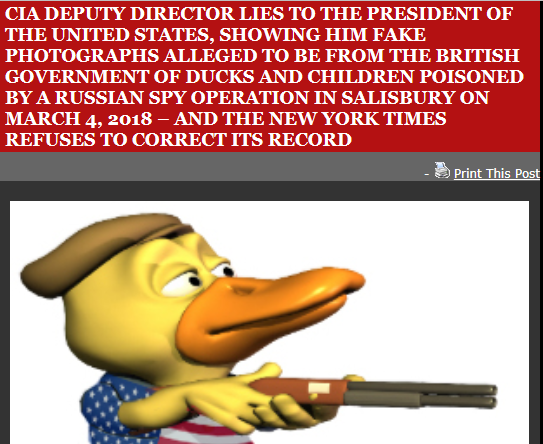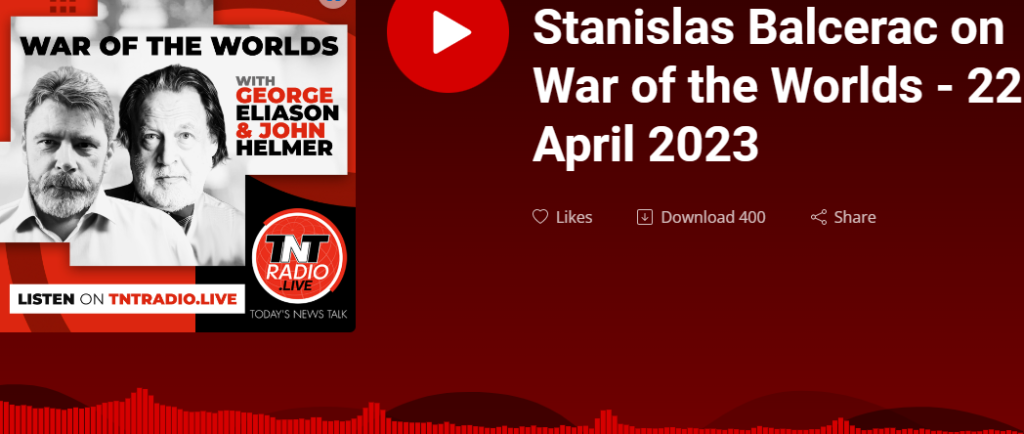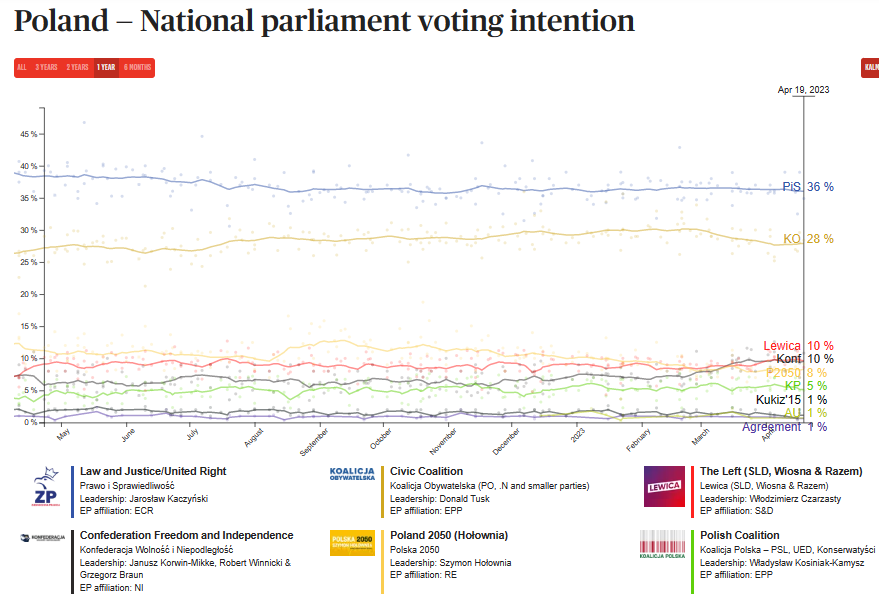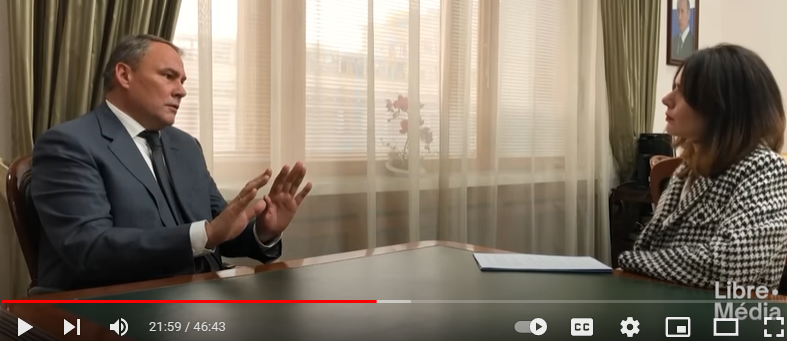

By John Helmer, Moscow
@bears_with
Late on Friday evening in New York, early Saturday morning in Moscow, the New York Times published a report by well-known mouthpieces for US and British intelligence on the Pentagon Papers.
This reveals fresh evidence of what the TNT War of the Worlds broadcast last week reported was the way John Teixeira, the alleged leaker of ten secret briefing papers on the Ukraine war from the US Joint Chiefs of Staff, was profiled by the Pentagon and over nine months of 2022 targeted in an official operation to disclose military secrets, which became public knowledge on April 6.
In this operation, Teixeira was the patsy for a Pentagon attack on Washington, Kiev and other allied officials who are planning to launch a Ukrainian counter-offensive against Russian forces. This, the Pentagon Papers reveal, risks not only Russian defeat of the Ukrainians on the battlefield, but also the destruction of US military dominance in Europe and the international credibility of the North Atlantic Treaty (NATO) alliance.
The report by Aric Toler of Bellingcat, Julian Barnes, and Malachy Browne of the newspaper, is headlined “Airman Shares Sensitive Intelligence More Widely and for Longer than Previously Known.” With Toler’s and Barnes’ long record for fabricating and promoting Ukrainian Secret Service (SBU), British Secret Intelligence Service (MI6), and Central Intelligence Agency (CIA) source lies, the article means the opposite of its conclusion: “The additional information raises questions about why authorities did not discover the leaks sooner”. This is the alibi of the official leakers – they didn’t fail to discover the leaks later, they launched them from the start.
The Bellingcat group and New York Times now reveal that Teixeira began leaking “sensitive” information in “February 2022, soon after the invasion of Ukraine”. Sensitive means not classified.
The reporters also call the leaks “secret intelligence on the Russian war effort” but they repeat this consisted of “posts containing the sensitive information” and “classified documents”. No direct evidence of what the reporters claim they “reviewed” has been published, neither their classification codes nor other document records. “While it appears that the user [Teixeira] likely posted pictures of some documents, those have since been deleted from the chat group.” In other words, the reporters are claiming they have seen “detailed written accounts” – written by Teixeira. How and from what source the Bellingcat group got this evidence is being kept secret still. How the group knows what Teixeira allegedly wrote and what is or was classified secret, they don’t say.
The reporters also reveal that Teixeira claimed to his chat group of adolescent gamers in September 2022 that he “usually worked with GCHQ [General Government Communications Headquarters] people when I’m looking at foreign countries.” This is now a hint that it was the British signals agency who detected what Teixeira was doing and, according to the standard intelligence-sharing practice, alerted the US counterpart National Security Agency, which then alerted the US Air Force commanding Teixeira’s unit and other agencies. This Pentagon the Pentagon– that’s now the hint that it was the British who first spotted what Teixeira was doing, alerted the CIA and Pentagon. If the latter didn’t know it already.
The reporters did not contact GCHQ directly to ask what they knew, when they knew it, and what they relayed to Washington. Instead, they say questioned the British Embassy in Washington where, they report, “a spokeswoman…declined to comment.”
If this was the sequence of events, it would represent significant mitigating evidence for Teixeira, as well as the legal defence of entrapment when he goes to court on charges of espionage. For the time being, the federal magistrate judge in the Boston proceeding has postponed the plea and bail hearing scheduled for Teixeira on April 19 to allow his defence attorneys time to review the evidence and prepare.
The attorneys are also likely to argue that the indictment of Teixeira under the Espionage Act, 3 requires proof of “intent or reason to believe that the information is to be used to the injury of the United States, or to the advantage of any foreign nation.”
The New York Times publication has identified Teixeira’s lawyer as a Boston public defender named Joshua Hanye. Hanye is a highly experienced, 19-year veteran of criminal prosecutions. For Hanye to be vetted and obtain the security clearances required for him to see the top-secret codeword documents alleged in evidence against Teixeira will requires weeks, if not months. For the time being, he has entered no plea in court, and he refuses to speak with the Bellingcat group.
If Teixeira and Hanye are suspicious that Bellingcat and the New York Times are working for the government against him, there is reason in the published report itself. Toler, Barnes and Browne claim that “the Times found an online receipt in Airman Teixeira’s name” for the purchase of an antique rifle. This indicates the reporters have had access to official evidence taken from Teixeira’s personal computer. This is not open-source journalism; this access means government authorization to Toler of Bellingcat for access to prosecution evidence.
Accordingly, in this case everything Bellingcat and the New York Times say should be taken down and used in evidence against them.
In the recent history of US espionage prosecutions, the defence of entrapment is rare.
One case was recorded in 1998. The most recent case, involving a US Navy officer, went to court in 2016 after the accused had spent nine months in prison, following seizure and search of his computer records, and after what was reported by investigators to have been interrogations leading to his confession.
Planting documents to substantiate a prosecution for espionage is not new. It was recorded in the government’s case against Charles Ruthenberg, the leader of the American Communist Party, in 1923.

Source: https://www.ojp.gov/
Rarer still is the engagement as a byline reporter for the New York Times of an employee of a foreign government-funded intelligence agency like Bellingcat. Aric Toler is an American who graduated with degrees in Russian from the University of Kansas between 2005 and 2013, and who spent several months in St. Petersburg and then a month in Kazan as a student. His resumé is missing one or two years between graduation and his employment by Bellingcat where he is now titled “director of training and research”. Toler has told Vanity Fair that before he joined Bellingcat he “did a stint at Bank of America”. This interview also reveals that another Times reporter, Christiaan Triebert, had worked at Bellingcat before joining the newspaper, and that Toler and Triebert had been collaborating together before the Teixeira case broke into print. Triebert is Dutch, with training in London; he has specialized in reporting on the Russian military in the Ukraine and Syria.
At Bellingcat Toler has specialized on publishing fabricated evidence obtained from Ukrainian intelligence in the Malaysia Airlines MH17 case, from MI6 in the Sergei Skripal Novichok case, and from the German government in the Alexei Navalny poisoning case.

Left to right: Aric Toler, Christaan Triebert, Julian Barnes, Malachy Browne.
Barnes has published lies he was given in the Skripal case by Gina Haspel, then deputy director of the CIA in what she claimed had been her briefing of President Donald Trump; the president then promoted Haspel to be his second CIA director. The lying was exposed by British officials; Barnes never corrected or retracted what he had done, nor answered reporters’ questions. He then repeated his lying in a story against Russia a year later. In his defence, Barnes told his newspaper colleagues, and also reporters from the BBC, that a lie in print isn’t a lie if the “research” into the truth is “ongoing”. Barnes also claimed it wasn’t his “place” to “substantiate” the lie he had already published.

Source: https://johnhelmer.net/
Malachy Browne is an Irishman. He has made a career record in little-known companies doing a commercial business of analyzing social media as information warfare by the Russians. One of his employers, an Irish company based in Dublin called Storyful, is run by ex-Rupert Murdoch media executives. It has been owned by Murdoch’s News Corporation since 2013. It has been caught spying on journalists, and reselling its findings to the New York Times, the Washington Post and the BBC.
These reporter prosecutors and propagandists have been all been part of the New York Times team identified in the small print at the bottom of each of the reports on the Pentagon Papers since April 9.
Listen to more on their veracity record in the first 20-minute segment of the TNT Radio War of the Worlds broadcast:

In the second and concluding segments of the programme, Stanislas Balcerac, the independent Warsaw political analyst and journalist in Warszawska Gazeta, analyses the several wars which the Polish government is fighting at the same time on its western and eastern fronts, and internally.
First, there is the German plan to topple the Law and Justice (PiS) party government in Warsaw, and manipulate European Union funding through the ex-German defence minister Ursula von der Leyen, now the European Commission president; second, the US attempt at regime change in Warsaw, led by Marek Brzezinski, the current US Ambassador to Poland; and third, the Kiev regime’s attempts to flood Poland with Ukrainian grain and other farm products, undercutting Polish prices, and destroying Polish farm livelihoods.
US INTERVENTION TO SUPPORT THE POLISH OPPOSITION PARTY, CIVIC PLATFORM

Balcerac reveals this chronology of recent events in Poland: on April 14 (left) Marek (Mark) Brzezinski met the Civic Platform leader, Donald Tusk. The next day, April 15, Tusk’s party called for a voter rally in Warsaw against the government. “This,” reports Balcerac, “is the classic scenario called in Polish ulica i zagranica – literally, the street and foreign influence – as a method for inducing regime change. Left: “Great meeting @donaldtusk with Poland's friend, US Ambassador Marek Brzezinski.” Right: “PiS wants to take away the possibility of free elections and is increasingly separating us from the democratic world. It's heading towards authoritarianism! Let's face them on June 4 in Warsaw at noon. In the name of free Poland and justice.”
Follow Balcerac’s reporting here. The Warszawska Gazeta archive does not enable automatic English translation by Google.
POLISH POLLS SHOW GOVERNMENT AHEAD OF OPPOSITION, 36% TO 28%

Click on source to enlarge and read: https://www.politico.eu
The rise of the Konfederacja (“Confederation”), a party with eastern Ukrainian and farmer support, already polling at least 10%, looks likely to deliver enough seats in the Sejm for the governing Law and Justice (PiS) party to keep power. “The party has long expressed anti-Ukrainian views, drawing largely on historical grievances, and these remain an integral part of its platform. MP Janusz Korwin-Mikke, 80, a central figure in Konfederacja and a Putin apologist [sic], was recently reprimanded for ‘suggesting to the public that Ukrainian citizens, not Russian soldiers, may have been responsible for the massacre of the Bucha residents,’ after he tweeted his own take on the mass killings by Russian troops. In a similar vein, Mikke implied that the US was at fault for the all-out invasion stating that ‘arming Ukraine provoked the Russian Federation.’” Quoted from https://cepa.org/
The Polish ban on Ukrainian farm products stopped grain, oilseed, eggs, honey and other products on April 15. It was followed by bans by Hungary, Slovakia, Bulgaria and Romania. Pressure from the European Commission in Brussels then forced the lifting of the embargoes on condition that the Ukrainian truck cargoes are sealed in their transit across Poland until they reach their purported consignment destinations in western Europe.
According to Balcerac, there has been no “Ukraine war bonus” for Poland. Instead, the government is paying the US for protection which Washington has turned into its opposite – regime change in Warsaw. One domestic political consequence is the rise of the anti-Ukrainian farmers and eastern Polish political party, Konfederacja (“Confederation”). Early this month, a senior figure from one of the ruling coalition, deputy agriculture minister Janusz Kowalski, announced that a coalition of the right should stop the regime change operations. “I have always said there are no enemies on the right; I have always been open to cooperation with Confederation. There are many very good politicians there… Voting for eurosceptics, eurorealists who think like United Poland on many issues is good for Poland.” .
Another Polish farmers’ party mentioned by Balcerac is the AgroUnia (AU). Its rise in the polls has yet to be registered beyond the 1% level in the currently polls because the farmers aren’t willing to level with the pollsters; or because they prefer Confederation. The AU had been polling at almost 6% in mid-2021 almost equal with Confederation; since then Confederation has gained roughly what AU has lost. .
In the broadcast, Balcerac adds that in Polish security and military strategy, the Ukraine is a battlefield buffering the Polish frontier from threatened attack by Russian forces. Poland is fighting to the last Ukrainian to defend itself.
In Moscow officials have been acknowledging publicly for months that the Kremlin would welcome Polish intervention in the western Galician region of the Ukraine to de-Nazify the current regime whose record during the last German occupation was to murder Poles, along with Jews and Russians.
In an interview with French journalist Anne-Laure Bonnel a few days ago in Moscow, Pyotr Tolstoy, a former journalist for Le Monde and currently Deputy Chairman of the State Duma, explained Russian thinking on the future for Poland. “No one in Poland believes in the European security guarantee [for Poland] any longer…After the war, you will see a new situation… Russia will never enter Poland, never. No, no, no. You won’t see us enter Poland, no, never. Poland, we leave to the European Union, and they are going to pull it to pieces.”

Duma Deputy Pyotr Tolstoy in interview (in French) with Anne-Laure Bonnel on April 11. Source: https://www.youtube.com/. From Min 19 to 22.











Leave a Reply